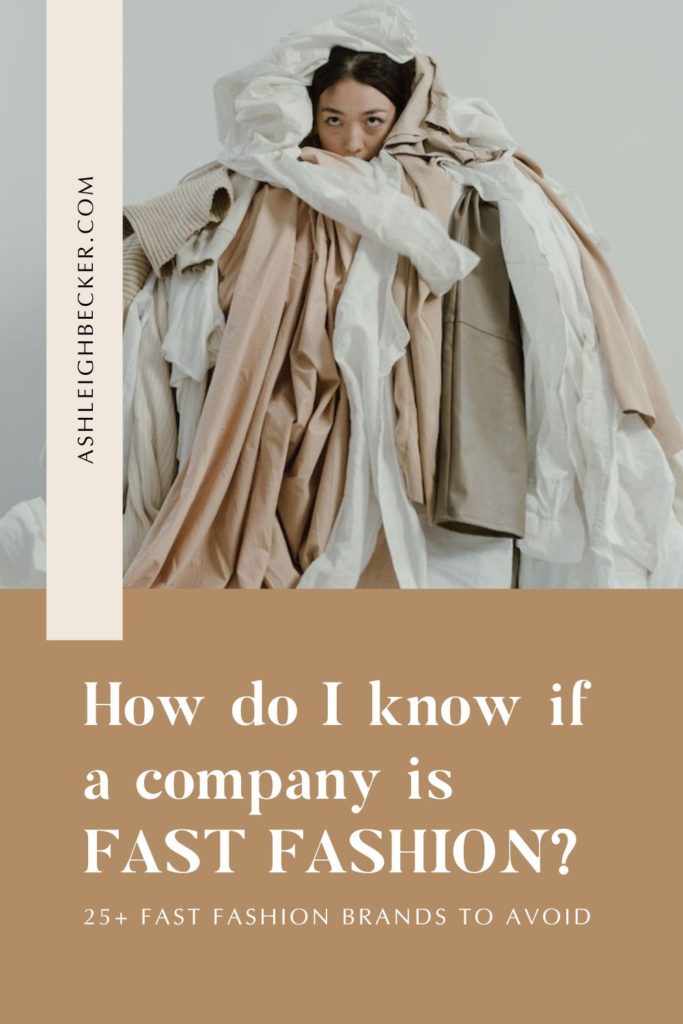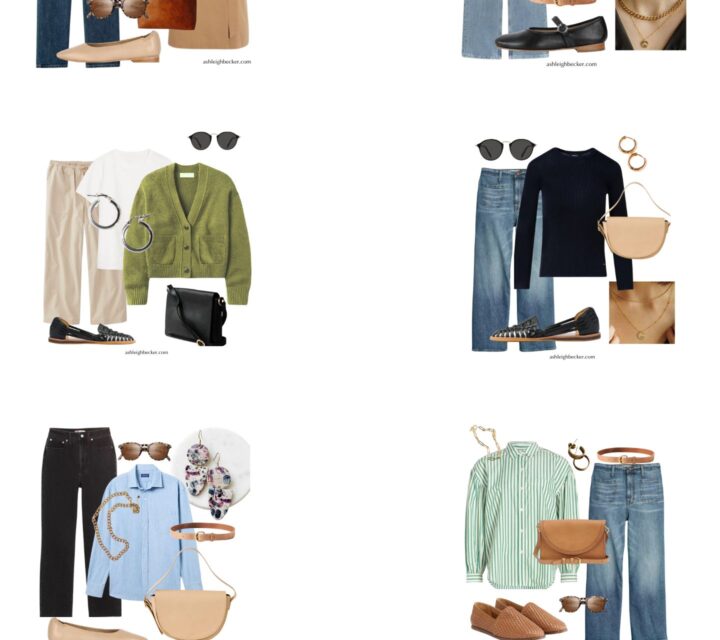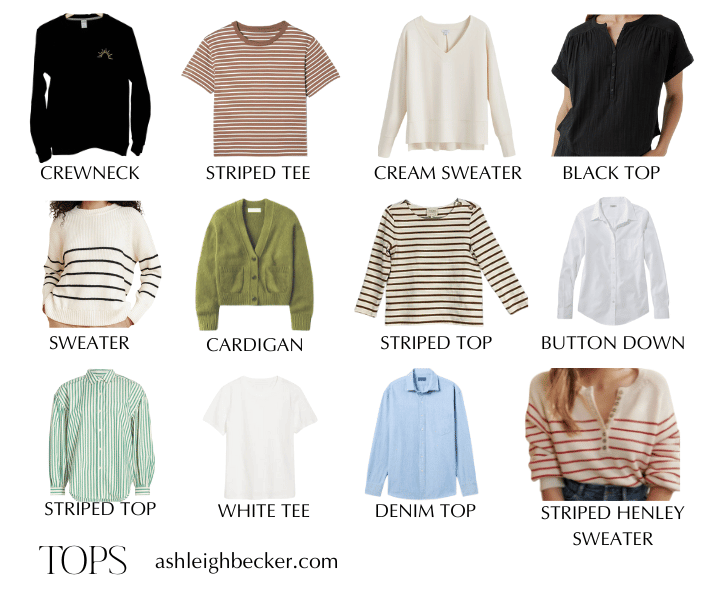How do you know if a company is fast fashion and one you should or should not support? They certainly don’t just come out and tell you how their clothing is manufactured, if their workers are being paid well and what happens to any wasted materials. If you’re wondering which clothing retailers are fast fashion and want to avoid supporting their poor manufacturing practices, I’ve got answers.

FAST FASHION BRANDS TO AVOID
Fashion is one of the largest industries in the world and the global fashion industry revenue is estimated to be between $1.7bn and $2.5bn. Source According to the 2016 True Cost Documentary, more than 80 billion pieces of clothing are purchased each year, which is more than 400% higher than a decade prior.
What’s more, Americans generate 16 million tons of textile waste each year and our country is consuming more clothes than ever before, thanks to the fast fashion industry. So how exactly do you know if a company is fast fashion?
What makes a company Fast Fashion?
Fast fashion is inexpensive clothing produced very quickly by mass-market retailers to continually produce the latest trends. This allows consumers to purchase new clothing often, but it is typically poorly made from cheap materials.
Companies like Zara changed the fashion industry in the early 2000s by making it their mission to produce clothing from design to their store shelves in just 15 days! What once took months to produce is now happening at warped speed.
Somehow, retail prices have managed to go down while the true cost of making clothes has increased. This has put tremendous strain not only on the environment, but also the people who make clothing. It is estimated that over $125 billion of fast fashion garments are created through modern day slavery. source
Read more about the human and environmental impact of fast fashion here.
How do I know if a company is Fast Fashion?
You are probably wondering how to know if your favorite clothing brands are fast fashion or not. Here are some easy ways to spot fast fashion:
- Most fast fashion companies produce new collections every week and encourage you to keep buying new trends.
- Look at the details tab on product pages to see where the product was made. If it just says “imported” that is a red flag to dig deeper.
- Go to the company’s website and click the ‘About’ section as most fast fashion companies will be very vague about where and how their clothing is produced. They don’t tell the stories of the working environments, benefits and wages paid to garment workers and fast fashion brands won’t have fair trade or fair wage certifications listed.
- Look for information about the company’s sustainability efforts. Are they working towards using sustainable fibers, non-toxic dyes or clean manufacturing practices? No certifications to prove it? The answer is mostly likely that this is a fast fashion brand to avoid.
- Beware of Greenwashing. Greenwashing is when a company uses imagery (like plants), trendy words like “natural” or “non-toxic” in their branding. This could make you think they are sustainable, when in fact, there is nothing to back those claims. Truly sustainable companies will go through the process
- Send an email. If you still don’t know whether or not a company is ethical send them an email and ask tough questions. See if they are willing to provide information. If their answers are not satisfactory, move on. This is how I know if a company is fast fashion or not.
How do I know if a company is ethical?
After learning how to spot a fast fashion brand, you might naturally become more skeptical and start also wondering what makes a brand ethical. You can read all about how to identify a slow, ethical fashion brand here and find a guide to my favorite ethical brands here. Here are some quick tips when checking out the sustainability and ethics of a clothing brand:
- Companies that are producing clothes ethically and sustainably will want you to know about it. Information will be plastered all over their website.
- Check out the ‘About’ section. A slow fashion company worth supporting will have ample information about the people who make their clothing, their sustainability efforts and ways they are using fashion for good.
- Look for certifications like B Corporation, Fair Trade Certified, Leather Working Group (LWG), Forest Stewardship Council (FSC), Better Cotton Initiative (BCI), and Global Organic Textile Standard (GOTS). These are just a few.
- Look for an ethical brand like ABLE who pay auditors to evaluate how their garment production facilities are run + publish the results.
- Want to know for sure? Here’s a list of ethical, slow fashion companies worth supporting.
25 Fast Fashion Brands to Avoid
1. Shein
Shein is one of the most popular fast fashion companies, especially among teens and 20 somethings. They add 500 new pieces of clothing to their website every. single. day.
Shein is known for stealing designs from other designers and using the original images to sell cheap copycats. When customers receive the item it’s cheap, ill-fitting and not as pictured.
If the Shein dress cost less than $10 who cares? Throw it away and move on, right? Wrong. That dress is probably made of plastics that are toxic to the environment. Shein’s throw-away culture is contributing to the 92 million tons of textiles that are wasted annually.
2. Nike
Nike was the world’s most valuable apparel brand in 2021 for the 7th year in a row. source. It’s widely know that Nike has used extensive slave labor in their supply chain. In 2016 it was reported that Nike cut ties with a labor rights organization that monitored the company’s supplier factories.
Nike sells 25 pairs of shoes per second (2 million pairs a day). That’s just the shoes, not even the clothes. Who is making those shoes?
In March 2020 a report was published by the Australian Strategic Policy Institute linking Nike to production in Uyghur slave labor camps. The Uyghur people are being forced by the Chinese government to work in production factories. Read more about Uyghur slavery here.
3. Zara
Zara is part of Inditex, a $29bn parent company, that owns seven brands. Other fast fashion brands include Pull & Bear, Massimo Dutti, Bershka, Stradivaruis, and Oysho.
Although Zara has made some efforts towards becoming more sustainable (recycled packaging and textile recycling), the brand has failed to prove that they are actually on target to reach their goals. They produce 12,000 new styles each year and have made no commitment to slow production.
Zara has revealed some of their suppliers, but won’t share them all. The company does not pay living wages and has been accused of forcing workers to work without pay.
4. Mango
When the Rana Plaza collapsed in 2013, killing over 1,000 garment workers, Mango’s factory was among those destroyed. Mango did not pay their workers after the collapse.
Mango has some sustainability initiatives in place like using more organic cotton and recycled polyester, which is a good step. However, their production levels have only increased in the last 5 years and there are no plans to slow.
Mango has also admitted to paying garment workings the minimum legal wage vs. a living wage. They are rated “Not Good Enough” on Good On You website.
5. H&M
H&M is the second largest fast fashion retailer in the world. Often accused of greenwashing, H&M is infamous for making sustainability claims that have no real value.
In 2013, after the Rana Plaza collapse, H&M promised to give all garment workers in their supply chain (850,000 people) a fair, living wage by 2018. As of 2022 that still has not happen. Another example of making promises H&M does not intend to keep.
H&M also among the companies that have burned their excess merchandise instead of recycling or donating it.
6. Victoria’s Secret
Victoria’s Secret is one of the most well known lingerie brands in the US. Although the company committed to getting rid of toxic chemicals in their products by 2020, they have failed to prove they actually did it.
Victoria’s Secret doesn’t share their suppliers or pay workers living wages. Several VS models have also accused the leadership of sexual harassment.
7. Forever 21
Forever 21 is known for making cheap, ill-fitting clothing. Their clothing is mostly made of synthetic fabrics which contributes to massive environmental issues.
Forever 21 has no regard for the garment workers in their supply chain as seen in their refusal to sign the Bangladesh Accord. They have been sued several times by workers who were not paid for their labor, as well as not paying fair or living wages. One report accused Forever 21 of paying workers in LA as low as $4/hour.
8. Boohoo, Pretty Little Thing, Oasis & Wallis
Boohoo is an online retailer that has grown through social media. Their clothing is incredibly low priced and targeted towards the younger GenZ crowd. Boohoo also owns Pretty Little Thing, Oasis & Wallis.
Boohoo is known for paying illegal, below minimum wages. They have also been named among the worst fast fashion offenders when it comes to environmental sustainability.
9. Urban Outfitters
Urban Outfitters is one of the largest retailers in America. Owned by parent company URBN, the company owns several others, Anthropologie and Free People to name a few.
Urban Outfitters has done little as far as sustainability efforts beyond switching some light bulbs and installing solar panels. They do not disclose suppliers or wages paid to garment workers.
Employees of Urban Outfitters reported they were asked to work for free during weekends. The company called it “training”. It has also been disclosed that they use L.A. sweatshop labor to make their clothes. Just another example that “made in the USA” does not automatically mean ethical production.
10. Fashion Nova
Fashion Nova is one of the fastest growing online clothing companies in America thanks largely to influencer marketing. The company sells cheap clothing made of low quality materials. In 2018, Fashion Nova was one of the top searched for brands on Google.
Good on You rated Fashion Nova very poor – the lowest rating possible. They release 600 new products every week. This is beyond fast fashion and put them into the ultra fast fashion category.
Fashion Nova has disclosed no environmental policies and has been reported for severely underpaying their workers.
More Fast Fashion Brands to Avoid:
- Primark
- Uniqlo
- Esprit
- Guess
- Missguided
- Hollister
- Hot Topic
- Brandy Melville
- Abercrombie & Fitch
- Garage
- Asos
- Top Shop
- Wish
- Zaful
- American Eagle
- Old Navy
- GAP
- Anthrologie
- Free People
- Nasty Gal
- Benetton
- Men’s Warehouse
How to avoid fast fashion clothing brands
In American culture we are programmed to consume constantly because we live in a society where everything is disposable and can easily be replaced at a low cost, that includes clothing. This mindset has been terribly detrimental to the people who made our clothes and the environment. Here are 5 ways to avoid shopping fast fashion, slow consumption and support ethical fashion brands:
1. Slow Down
Start your ethical fashion journey by slowing down. Consider a one month spending freeze where you don’t buy any clothing at all. Wear what you have. Shop your own closet and try new combinations. You can learn all about how I did just that here.
When you stop consuming, even for a short time, it helps curb your desire to always be buying more. Many times we shop out of boredom or habit. Try your best to slow down your shopping.
2. Make a list
Make a list of items you think you need. I keep mine in my notes app so I always have it with me. Don’t buy anything right away.
Once you add something to your list wait a week or more before you even start looking. Make sure you really need it before making a purchase. Sometimes I wait a few months and then realize I didn’t really need the thing I was originally desperate to have.
3. Consider Secondhand options
The most sustainable option for shopping is to buy things secondhand. From local thrift stores to online resale sites like ThredUP and Poshmark, there are endless ways to make secondhand purchases.
4. Choose quality over quantity
Whatever it is that you are searching for choose the best quality you can afford. Look for natural and sustainable materials like organic cotton, wool, tencel, hemp and bamboo. If synthetics are a must can you find it in a recycled fabric?
Look for thicker fabrics that feel substantial. Avoid plastics in hardware like zippers. Check to see that seams are sewn well. These simple checks will save disappointment and help you avoid buying clothes that won’t last more than a few wears.
5. Find alternatives to your favorite fast fashion brands
Finally, remember that on a slow fashion journey you are probably still going to buy clothes. Do your research!
In addition, this list of fast fashion brands to avoid is not comprehensive and many others could still be added to the list. Make sure you check out each brand before making a purchase because you want to be sure it is an ethical brand worth supporting.
You need to find an ethical brand worth supporting to replace the fast fashion brands you used to shop with. Don’t know where to start? Here’s a list of my favorite ethical fashion companies.





